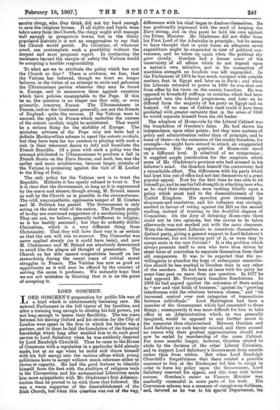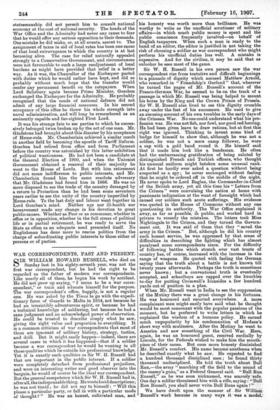LORD GOSCHEN.
T ORP GOSOHEN'S preparation for public, life was of –11.4 a kind which is unfortunately becoming rare. He entered Parliament in the full vigour of his facultieS, and after a training long enough to develop his full powers, yet not long enough to lessen their flexibility, The ten years between his leaving Oxford and his election for the City of 1,9n4on were spent in the firm in which his father was a partner, and in them he laid the foundation of the finimoial knowledge which long after enabled laina to do such good service to Lord Salisbury when lie was suddenly deserted by Lord Randolph Churchill, Thus he came to the House of Comilltels with a reputation in a particular field already made, but at an age when he eauld still throw himself with hie foil energy into the various offices which young politicians have to accept without much reference either to choice or capacity. He had the good fortune to identify himself from the first with the abolition of religious tests in the Universities, and his ecclesiastical Lihernlistn made hiin more sympathetic with Mr. Gladstone's first Adminis- tration than he proved to be with those that followed. He was a warm supporter of the disestablishment of the Irish Church, but When thin questien was out of the way, differences with his chief began to diaelose themselves. He was profoundly impressed with the need of keeping the IVavy strong, and on this point he held hM own against the Prime Minister. Mr. Gladstone did not differ from his First Lord of the Admiralty in principle; but he seems to have thought that in quiet times an adequate naval expenditure might be suspended in view of political con- venience, and be taken up again when the political sky grew cloudy, Gescben had a keener sense of the uncertainty of all affairs which do not depend upon
nation's MA initiative, and in his conception of maritime strength no loophole was left unguarded. In the Parliament of 187+ be wee much occupied with outside matters, first in Egypt and later on in Paris ; and when the Liberals returned to power in 1880 he was shut out from office by his views on the county franchise. He was opposed to household suffrage in counties, which had been imported into the Liberal programme, and later on he differed from the majority of his party on Egypt and on Ireland. Of no man of Cabinet rank could it have been predicted with greater certainty that in the crisis of 1886 he would separate himself from hie old leader:
The adoption of Home-rule by the Liberal Cabinet was the foundation of Goschen's fame. He had shown his independence upon other points ; but they were matters of policy and administration rather than of principle, and to some of them—to the extension of the county franchise, for example—he might have seemed to attach an exaggerated importance. But the question of Home-rule stood on a different level. It admitted of no compromise ; it supplied ample justification fer the suspicion which sense of Dir. Gladstone's previous acts had aroused in his follower's mind. On Goschen himself the controversy had a remarkable effect, The differences with his party which had. kept him out of office had not lent themselves to a great popular appeal. Now for the first time he was able to let himself go, and to use his full strength in attacking men who, as he read their intentions, were rushing blindly epee policy which raust lead to the dismemberment of the united Kingdom. His speeches grew immensely in eloquence and resolution, and his influence was strongly exerted in favour of voting against the Bill on the second reading, instead of trusting to the doubtful eheneee of Committee. On the duty of defeating Home-rule there could not be two opiniona, but the course to be taken afterwards was not marked out with the same clearness, Were the dissentient Liberals to constitute themselves a distinct party, giving a general support to Lord Salisbury's Government, but not forming part of it, or were they to accept seats in the new Cabinet ? It is the problem which always presents itself to men who have been driven by sheer force of conviction to separate themselves from their old companions. It was to be expected that the un- willingness to abandon the hope of subsequent reconcilia- tion should be less marked in Etoschen than in any other of the seceders. He had been at issue with his party for some time past on more than one question. In 1877 he had opposed Mr. Trevelyan's franchise Resolutions, In 1883 he had argued against the extension of State action to "new and vast fields of business," against its "growing interference with the relations between classes," and "its increased control over vast categories of transactions between individuals." Lord Hartington had been a member of the Government which had consented to these things ; consequently it was more difficult for him to take office in an Administration which, as was generally imagined, would be opposed to any further resort to the measures thus characterised. Between Goschen and Lord Salisbury no such barrier existed, and there seemed no reason why their gradual approximation should not now be sealed by membership of the same Cabinet. For some months longer, however, Gosehen elected to abide by the decision of the other Liberal Unionists, and to support Lord Salisbury's Government from outside rather than from within. But when Lord Randolph Churchill's forgetfulness that there existed a possible successor to him at the Exchequer led him to resign in order to force his policy upon the Government, Lord Salisbury renewed his appeal, and this time with better success. • Goschen's career as Finance Minister was markedly successful M. some parts of his work. His Conversion scheme was a measure of conspicuous boldness, and, devoted as he was tç lila isciga !Department, his
statesmanship did not permit him to consult national economy at the cost of national security. The heads of the War Office and the Admiralty had never any cause to fear that he would offer any serious opposition to their demands. One mistake he did make, or, at all events, assent to. The assignment of taxes in aid of local rates has been one cause of that local extravagance to which the country is at last becoming alive. The case for relief naturally appealed strongly to a Conservative Government, and circumstances were not favourable to such a large readjustment of local burdens as might have provided that relief in a better way. As it was, the Chancellor of the Exchequer parted with duties which he would rather have kept, and did so probably without much hope that the transfer would confer any permanent benefit on the ratepayers. When Lord Salisbury again became Prime Minister, Goschen exchanged the Exchequer for the Admiralty. He probably recognised that the needs of national defence did not admit of any large financial measures. In his second occupancy of this office he threw his whole strength into naval administration, and will long be remembered as an eminently capable and far-sighted First Lord.
It was his strange fate to see parties to which he succes- sively belonged twice broken up by the act of one man. Mr. Gladstone had brought about this disaster by his acceptance of Home-rule. Mr. Chamberlain achieved a similar result in another field by becoming the apostle of Tariff Reform. Goschen had retired from office and from Parliament before the country was astonished by this latter exhibition of political wantonness. He had not been a candidate at the General Election of 1900, and when the Unionist Government obtained a renewal of their majority he went to the House of Lords. But with him retirement did not mean indifference to public interests, and Mr. Chamberlain found him the same resolute adversary that Mr. Gladstone had found him in 1886. He was no more disposed to see the trade of the country deranged by a return to Protection than he bad been some seventeen years earlier to see the unity of the country imperilled by Home-rule. To the last duty and labour went together in Lord Goschen's mind. Neither age nor ill-health nor bereavement made any change in his devotion to great public causes. Whether as Peer or as commoner, whether in office or in opposition, whether in the full stress of political life or in partial retirement, he was ready to serve the State as often as an adequate need presented itself. No Englishman has done more to rescue politics from the charge of subordinating public interests to those either of persons or of parties.







































 Previous page
Previous page